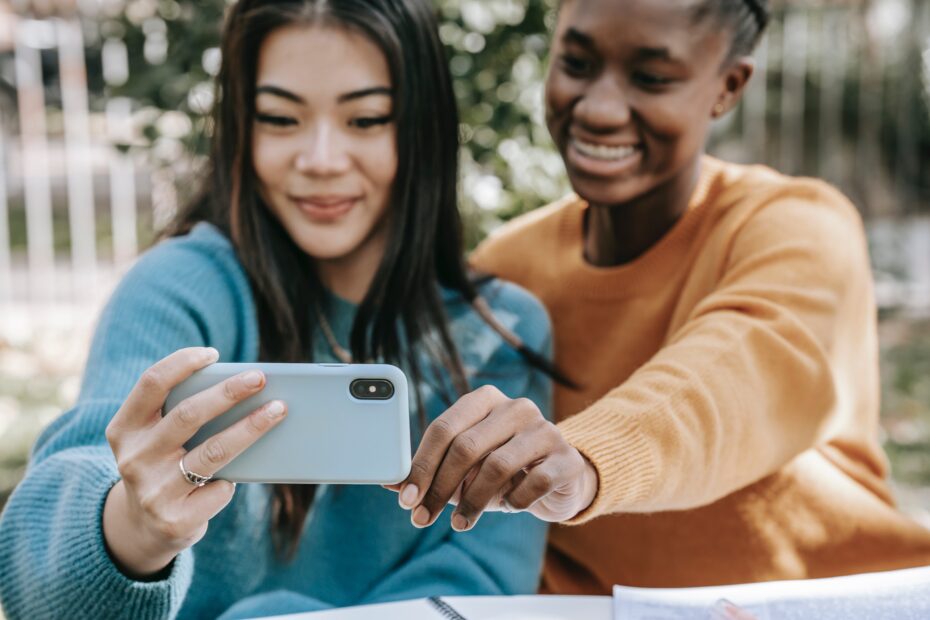How to use social media without hurting your mental health –
What we're covering..
Introduction 👋
Social media is an incredible tool!
It:
- is entertaining 🤹♀️
- connects you to others 💞
- helps you learn 🤓
- can inspire you ✨
- gives you a way to express yourself 🎨
BUT
It can also have a huge impact on your mental health! 🧠
Using social media in a bad way can make you to feel things like:
- Depression
- Everyone is better than you
- Isolation
- Pressure to change yourself
- Loneliness
- Your life isn’t good enough
- Distracted all the time
- Stress
- Pressure to do things you wouldn’t normally do
- You can’t sleep
- Anxiety
- Your appearance isn’t good enough
Social media can hurt your mental health in a lot of ways.
This makes it soo important to find ways to look after yourself in the big, complicated world of social media! 📱🌎
Today we’re going to talk about how you can use social media without hurting your mental health! 🩹
Acknowledge fakeness 💄
As you probably know, social media is not real life! 🌎
When people post on social media, they carefully control and edit what they share. ✂️🖊️
A lot of the time, people post things that aren’t even real. 😱
Whether it’s:
- putting filters on a photo to look more attractive,
- spreading rumours about someone,
- telling a white lie to make themselves look better,
- pretending to be rich,
- only posting the best parts of your life,
- saying something shocking to get attention,
- spreading fake news to panic people,
fakeness is everywhere on social media! 🥸
It’s really important to acknowledge this with everything you read/watch on social media, because posts can have a huge impact on how we feel. 💘
Whilst it can be amazing when social media makes us feel happy…
Social media posts can make us feel a lot of negative things like:
- sadness
- anger
- hurt
- shock
- panic
- insecurity
- fear
but we might be feeling those things for no reason, because what we’ve seen/read online is totally fake! 😟
It’s important to not get too invested in what you see online, because there is so much fakeness on social media. 👀💔
Every time a post makes you feel something bad, remind yourself that it might not even be real, to protect your mental health. 💖
Don’t compare yourself 🪞
People on social media rarely post things that make themselves look bad. 🤪
When you see people’s social media, they’re usually only posting the highlights of their life. 🌟
If you compare yourself to people on social media, you’re comparing your normal day to their best, edited version of their day. ☀️🌧️
You’ll never win if you compare yourself to someone’s social media!
In reality, people from social media are probably a lot like you, with flaws, insecurities, and stress, that don’t get posted online.
Don’t compare yourself to people online, to protect your mental health.💖
Think about why they posted it 🤔
Reading/watching posts on social media can feel like an emotional rollercoaster. 🎢
You’re constantly bombarded with people telling you how to think, feel, and live your life! 😟
Don’t let them take you on the emotional rollercoaster! 🙅♀️
Instead – think about why someone might’ve made that post.
For example – you see a glossy athlete – someone who looks completely unrealistic, in a post, exercising. 🏋️
The likelihood is that the post is intended to make you feel insecure, and to encourage you to buy exercise products, to look like the unrealistic athlete! 🏃♀️👟💸
Instead of letting the post make you feel insecure, you can realise that they’re just trying to sell you something, and move on. 😊
Next time a post makes you feel strong emotions, consider why that person posted in the first place. 🧠
People and businesses almost always post for a reason. 💭
They could be trying to:
- Encourage you to buy something
- Show off a “perfect life”
- Gain followers
- Make money
- Create drama
- Make people feel scared
- Get attention
- Start arguments
- Make you feel insecure
Unfollow people who make you feel bad about yourself 👋
One of the best ways to protect your mental health when using social media, is to control what you see. 👀
Got someone on your insta showing off and making you feel bad? 💃🕺
Unfollow them!
Is someone sending you rude messages? ✉️
Block them!
It’s not worth sacrificing your mental health to follow people who make you feel bad.
Instead, look for people who make you feel good about yourself, inspire you, teach you, or entertain you! ✨
Be yourself 💃🕺
If you’re someone who posts on social media, you can end up feeling a lot of pressure to change yourself, and become a different person online. 🥸
Don’t try and be someone else when you post!
Did you know that a lot of social media influencers tend to struggle with their mental health, when they don’t post their authentic selves online?
When you act differently online, it can create pressure for you to constantly be different, rather than being comfortable just being yourself.
Sometimes influencers even end up becoming jealous of their “virtual lives”, because what they post is so different to their real lives! ☹️
There’s nothing wrong with being just yourself online, and it could help your mental health if you do. 💖
Ignore the negative comments 🤷♀️
This is a reeeally difficult thing to do!
Naturally as humans, we tend to focus on negativity. 😬
It’s easier to remember the worst thing that someone has said to you, than the best, right?
When you’re using social media you need to ignore the negative comments. 🧘♀️
You could get a million really positive comments from people, but you’ll end up focusing on the 1 negative comment. 🧐
These comments can really stick in your mind and make you feel sad. 🧠
When you learn to ignore negative comments, it is easier to avoid letting social media impact your mental health. 💖
Remember you can’t please everyone ✌️
You can’t please everyone, especially when it comes to people on the internet.
On the internet people will say things that they don’t mean, or would never actually say to people in real life! 🤷♀️
If someone is negative about what you post, don’t waste your time (and precious mental health) worrying about it! 😎
Focus on posting what makes you happy, rather than worrying about what others will think. 💖
Remember it’s easy to misunderstand what people write online 🤔
It’s also very easy for people to misunderstand each other online. 🥴
Someone might say something which they think sounds kind, but when written down it sounds horrible!
Whenever you read something online, remember the person who wrote it might’ve meant something different to what you’re reading. 🤷♀️
It’s difficult to understand what people mean online because you can’t always:
- understand if they spelled everything correctly
- hear their tone of voice
- see their facial expressions
- see their body language
It can be very easy for us to read comments and assume that they’re trying to be mean!
If someone comments offends you, it can be easier to just assume you’ve misunderstood them, and move on. 🏃♀️💨
Don’t live for the likes 👎
It’s nice to get compliments and to feel connected to people. 🤩
BUT –
If you live for the likes, you might feel lost when you don’t get them.
Imagine your post went viral on Tiktok and had 1 million views – how would you feel if your next post had only 4 views?
Not great, right? ☹️
If you post to get likes, you’ll always find yourself getting disappointed. ☹️
Limit your time ⌚
Social media is a great way to connect with people, and can actually help improve your mental health!
However, the longer you spend on it, it can actually do the reverse and hurt your mental health. 🧠😟
A lot of experts recommend that you should spend just 30 minutes or less on social media per day to keep your wellbeing in tip top condition. ⌛
This might sound like a really difficult target for people who use it all the time.
BUT
Even if you can get your social media time under 2 hours per day you can see a huge improvement in your mental wellbeing! ☀️
Focus on real-life connection 🤝
Real-life connections and in-person friendships are amazing for helping your mental wellbeing. 🤩
However, social media can often make us quite lazy with our friendships…
Before you know it, we’re spending more time with our friends online than in real life! 🥴
So, why not try and use social media to focus on maintaining your real-life connections? 🤗
Instead of just liking your friends’ posts or sending random messages, ask them to meet up instead! 🙋♀️
Don’t get pulled into keyboard warrior moments 🌪️🥷
We all know what it’s like, you see a comment or message that triggers you – suddenly you spend the whole night arguing online! 👿
Don’t fall into the trap! 🪤
Online arguments can cause you:
- Stress
- Anxiety
- Sleepless nights
- Fear every time your phone notifications go off
Whilst it can initally feel really frustrating seeing triggering comments, often it’s easier (and better for your mental health) to just scroll on by.
Try not to let them upset you! 🥷
Sometimes it’s better to protect yourself from the stress of arguing, than to argue with people online. 💖
Find a community that makes you feel good about yourself 🤗
One of the best parts about social media is that there are so many different communities that you can become part of! 🤩
It has never been easier to find a group of friends that love you for who you are.
Make the most of it!
Instead of using social media to follow people who make you feel bad, join communities that make you feel happy. 💖
Get help if you’re being bullied, threatened, or feel unsafe 💖
Sadly, with all of the amazing things that social media brings us, there are also people who use social media for bad things too. ☹️
If you ever feel bullied, threatened or feel unsafe from using social media, it’s really important to get help.
This could be from someone like:
- A trusted friend
- Family members
- Your doctor
- A therapist
- The police
- Your boss at work
- Your teachers at school
- A charity helpline
Conclusion 👍
So that’s it!
You can use social media without hurting your mental health by:
- Acknowledging fakeness 💄
- Not comparing yourself 🪞
- Thinking about why they posted it 🤔
- Unfollowing people who make you feel bad about yourself 👋
- Being yourself 💃🕺
- Ignoring the negative comments 🤷♀️
- Remembering you can’t please everyone ✌️
- Remembering it’s easy to misunderstand what people write online 🤔
- Not living for the likes 👎
- Limiting your time ⌚
- Focusing on real-life connection 🤝
- Not getting pulled into keyboard warrior moments 🌪️🥷
- Finding a community that makes you feel good about yourself 🤗
- Getting help if you’re being bullied, threatened, or feel unsafe 💖
If you know any friends or family members who might benefit from learning about how to use social media without hurting your mental health, share this post with them!
Finally, don’t forget to check out our similar articles below!
Similar articles to “How to use social media without hurting your mental health” ⬇️
10 ways to be less hard on yourself 💖
How to develop a growth mindset 🪴
🎓
Follow us!
for free daily Grown-Up lessons 🙌🎉



